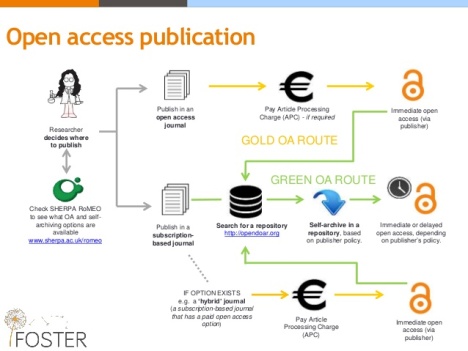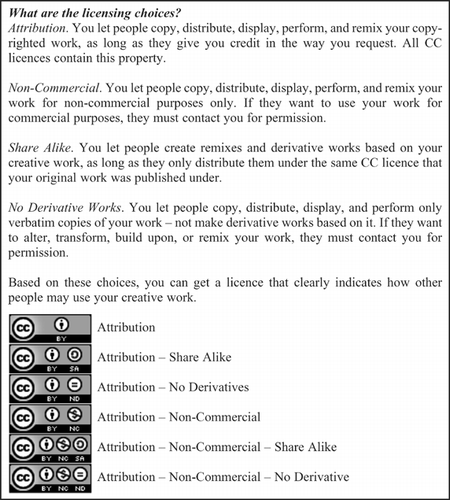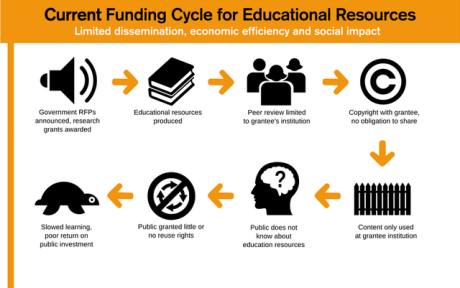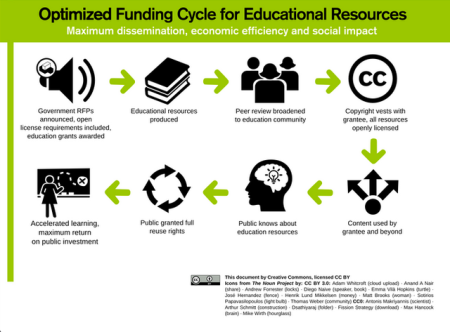
As a student, having access to academic articles has become an important element in my education. It helps me to get a better understanding of subject by exposing me to different ideas and concept of the topic. With open access, I am grateful that I do not have to pay to read these articles because as a student, we do not have the financial ability to pay for every article we read.

There are many articles saying that open access is good but mostly is about the user of those materials not the content producer. Hence, it got me thinking what if I am the content producer. Is it beneficial for me? Thus, I reflect on my purpose when writing blog post like this which is to get as many people to read as possible and explore my ideas further and if my content ever helps my readers to improve on their understanding of this topic, I actually feel a sense of achievement.
With open access to my materials, many people can easily access to my work and if it is insightful, people will use it. With citation, it helps to increase my credibility and raise awareness to my opinion to this subject. For the past few topics, we talk about creating an online profile so just imagines the impression you will create for yourself when the article you have written is being well-received by the readers.
On the other hand, if I were to make my material open access, how do I cover my cost and how can I protect my work from being misused. By making my material open access, it means that I have to pay for the publication fees so that other people can easily enjoy my hard work for free. After reading many articles, research has shown that there are grants that helps to cover author’s research cost. As for the possibility of plagiarism, open access actually helps to spot plagiarism because once a person copied your work without citing your sources will be easily identified by the timestamp of your work when publish online. For extra protection for your work, content producer can also apply for copyright licenses.

In conclusion, there are many pros and cons to consider when deciding on using the open access approach but by the end of the day, you have to see for yourself the purpose in creating the content is to earn money or to share information. For me, I’m willing to share my information openly but being content producer will not be my main job unless I was being paid to be a content producer.
Below are videos and image that helps me in my learning for open access


Reference
(2015). Retrieved 11 November 2015, from https://www.youtube.com/watch?feature=player_embedded&v=L5rVH1KG
Creative Commons,. (2013). Public Access to Publicly Funded Materials: What Could Be. Retrieved 11 November 2015, from http://creativecommons.org/weblog/entry/39707
Edanzediting.com,. (2013). Advantages and Disadvantages of Open Access | edanz editing global. Retrieved 11 November 2015, from http://www.edanzediting.com/blog/advantages_and_disadvantages_open_access#.VkK5XdIrLb0
Permission granted: open licensing for educational resources. (2015). Open Learning, 24(1), 101. http://dx.doi.org/10.1080/02680510802627886
Re…, E., pub…, S., Co…, O., inform…, G., & …, P. (2015). Advantages and disadvantages of Open Access. Tue.nl. Retrieved 11 November 2015, from https://www.tue.nl/en/university/library/education-research-support/scientific-publishing/open-access-coach/general-information-news/pros-and-cons-of-open-access/
Slideshare.net,. (2015). Open Access: Which Side Are You On. Retrieved 11 November 2015, from http://www.slideshare.net/cirasella/open-access-which-side-are-you-on-oa-week-2013
Sylvia.,. (2014). Topic 5: Advantages and disadvantages to a content producer of making their materials freely available online. Retrieved 11 November 2015, from https://sylviakangkang.wordpress.com/2014/12/09/topic-5-advantages-and-disadvantages-to-a-content-producer-of-making-their-materials-freely-available-online/

How’s it going Andrea
You mentioned in your post that “you have to see for yourself the purpose in creating the content is to earn money or to share information.”
In the current age most content producer are unable to achieve both aspects of it, where they can generate a sustainable revenue as well as gain the fame when someone cites their work. As you have mentioned, because of a paywall, people are avoiding the content that is behind it and thus the content producer would not be gain the exposure he needs. However some producers have no choice as they need to cover their cost and hard work.
Here is my question for you, do you think it’s possible to achieve a “win win” situation for both the consumers and the content producer?
I came across an article that mentions on a “pay to go” model, where consumers will pay a small sum of money as they progress into the content, for example 3 cents per page. Instead of paying a lump sum up front, consumers now are able to do it in a less “expensive” way, a 3 cent per page model may seem to be relatively cheaper than a up front lump sum payment, which may encourage more consumers to adopt the paywall model. I am aware that there is already such models where a sneak peak of the content can be showed before paying a lump sum, however base on the video that Lisa shared, it is stated that these “sneak peaks” are often useless in showing the main idea of the whole content. What do you think?
Article link : http://www.bbc.com/news/technology-24759239
Video link: https://www.youtube.com/watch?feature=player_embedded&v=L5rVH1KGBCY
LikeLike
HI Clinton!
Everything is good!
As for your comment, I agreed that some producer may be hard for them to cover out their cost when producing their content. However, nowadays, there are governments,companies and universities investing money on content producer by providing them with different grants. Hence, I believe that content producer is able to explore ways that they can cover up their cost while enjoying the benefit of great exposure through Open Access.
Here are some links that you may like to explore about the ways content producer can cover up their cost through Open Access.
http://www.slideshare.net/cirasella/open-access-which-side-are-you-on-oa-week-2013 –> Pg38,39
http://www.openoasis.org/index.php%3Foption%3Dcom_content%26view%3Darticle%26id%3D347%26Itemid%3D377
I also agreed on the video Lisa shared because I do find those sneak peak useless sometimes because it only show the first page of the content and it does not helps me in gauging how helpful the following information will be. For the “pay to go” model, it can be another way that content producer can use but it really depends on the different consumer. Once there are money involve, some consumers may be skeptical in exploring this method and as a result, the exposure of the author’s work is limited. On the other hand,if this method is proven credible in getting articles that is of good quality with valuable information that can be useful for me, I actually don’t mind paying.
LikeLiked by 1 person
Pingback: Reflection On Topic 5 + 2 Comments |
Hey there Andrea!
I really enjoyed reading your post. I like how you introduced the general support of students (which is highly relatable to us) regarding open-access as we are the end-users of the content. Then moved on to refocus on the perspective of the content producer, in response to the question.
In your post, you mentioned that at the end of the day, “you have to see for yourself the purpose in creating the content is to earn money or to share information.” with regards to whether to support or deny open access. I understand that you are conveying that the different motivation of the content producer would affect the type of access provided to end-users. However, what if the content producer does not have a distinct preference to either earn from sharing the content, OR to do public good – I believe very often, it is a skewed scale between these 2 main ideas and it may not really always be an “Either, Or” case. In that situation, can we find a balanced solution?
From my research, I learnt that there are organisations that are devoted to supporting both the content producers and end-users like ourselves, which have regular funders to help cover the publication costs for content producers, while keeping the content free for the public’s use. An example would be Wiley (www.wileyonlinelibrary.com/onlineopen). Although they do not provide monetary incentive for content producers, they do have a framework to support the basic issues content producers face in open access (eg. heavy publication and licensing fees). In my opinion, other passive rewards systems such as Youtube’s and Facebook’s cash rewards based on degree of circulation of content could also be adapted to deal with this dilemma.
With such frameworks already in place, do you think in time to come, other frameworks can be built upon this, to somehow provide the balance the content producers seek?
I would love to hear what you think!
LikeLike
Hi Andrea!
It was refreshing to see that you had chose to write about the benefits/repercussions for the content producer instead of focusing on the end-user as what many others had done.
After reading through, I have a couple of questions for you.
“With citation, it helps to increase my credibility and raise awareness to my opinion to this subject.”
How exactly does citation increases credibility?
Keeping in mind that technically, anyone can publish papers and the content might even be questionable. So even if there’s a lot of citations, the credibility of the author might take a plunge once his work is found out to be wrong.
“…by the end of the day, you have to see for yourself the purpose in creating the content is to earn money or to share information.”
I disagree with your statement. Many academics do not do their work for monetary incentives. For them, it is the pursuit of a passion. The charges for their papers often do not come from the producers, but from the distributors. They usually have limited control over the pricing.
With that in mind, I’ll like to hear your thoughts on this producer-distributor relationship as the two are often mixed up. Thank you! 😉
Edward 😉
LikeLike
Pingback: Reflection on Open-access to Content, Do I Feel the Same About it as Before? | jastypes
Pingback: Reflective Summary (The Origins Of The Internet) | CARPE DIEM